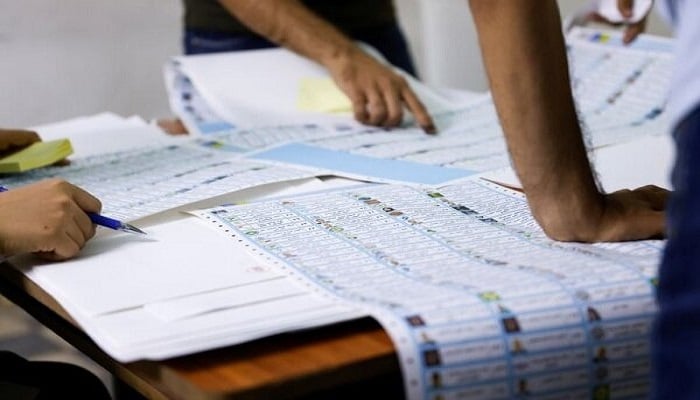PNN – Iraq’s parliamentary elections are scheduled to be held on February 11, while various political parties and movements have formed different lists to compete with each other.
According to the report of Pakistan News Network, citing the Lebanese newspaper Al-Akhbar, the Iraqi parliamentary election campaign has entered its third week. More than 21 million Iraqis are eligible to vote on February 11 to elect 329 members of parliament from more than 9,000 candidates competing in 31 electoral coalitions.
The political and social atmosphere, both domestically and internationally, is completely different from the atmosphere prevailing during the previous parliamentary elections in 2021. This difference lies in the political stability achieved due to the policies of the government of Mohammed Shia Al-Sudani, which has helped implement development programs and structural reforms, attracting more than $100 billion in foreign investment. These measures have provided more than 500,000 job opportunities for young Iraqis in the private sector.
Lists and coalitions
In these elections, more than 9,000 candidates for parliamentary seats were distributed among 343 parties, which ultimately came under the umbrella of more than 30 electoral coalitions. In the upcoming elections, the Kurds and Sunnis have continued to maintain their political cohesion, preventing the formation of multiple parties or lists that could disperse the people’s votes.
Read more:
Iraqi elections and the role of foreign actors; what is Washington’s intervention like?
Kurdistan region of Iraq
In the Kurdistan Region of Iraq, there are 5 lists, 2 of which belong to 2 traditional parties that usually hold the Kurdistan Regional Government and key positions in the region and Baghdad.
The Kurdistan Region lists include the following:
- The list of the Kurdistan Democratic Party led by Massoud Barzani, which is concentrated in the provinces of Erbil and Dohuk and has also entered the competition in Nineveh and Kirkuk.
- The list of the Patriotic Party of Kurdistan, led by Bafel Talabani, is concentrated in the provinces of Sulaymaniyah and Kirkuk and competes with other parties in other provinces.
- List of Gorran/Change that is centered in Sulaymaniyah.
- List of the Kurdistan Islamic Union, which is mostly concentrated in Sulaymaniyah, Kirkuk, and Erbil.
- List of Islamic groups that are present in limited areas of the region.
In addition to these main lists, there are also some secondary electoral lists that do not have much power.
Iraqi Sunnis
In Sunni-majority areas, only four coalitions are seriously competing to enter the Iraqi parliament, including:
- The Advancement Coalition, headed by Muhammad al-Halbousi, the speaker of the last two terms of the Iraqi Parliament.
- Al-Siyadeh coalition headed by Khamis Al-Khanjar.
- Azm Coalition headed by Muthanna Al-Samarai, a member of parliament.
- The Hasm Coalition, headed by the current Minister of Defense, Thabit al-Abassi.
Predictions show that the Priority List will win the highest number of votes among Sunnis and will come in second place nationally. Other Sunni lists will come in lower. Iraq’s Sunni-dominated regions have managed to prevent the formation of small lists in these elections.
Iraqi Shiites
Areas with a Shiite majority see the highest number of electoral lists and coalitions. According to information from the Iraqi Supreme Election Commission, the Shiite lists are as follows:
- The Construction and Development Coalition headed by Iraqi Prime Minister Muhammad Shia al-Sudani.
- The Government of Law coalition headed by former Prime Minister Nouri al-Maliki.
- The Coalition of the Righteous, headed by Sheikh Qais Al-Khazali.
- Badr List, headed by Hadi Al-Amiri.
- Coalition of government forces headed by Sayyid Ammar al-Hakim.
- Al-Asas Coalition, headed by Mohsen Al-Mandalawi, the current Deputy Speaker of the House of Representatives.
- The “Absher or Iraq” coalition, led by Sheikh Hammam Hamoudi, head of the Supreme Islamic Council of Iraq.
- The Services Coalition, headed by Shabel Al-Zaidi and Muhammad Sahib Al-Daraji.
- List of Rights, headed by Representative Hussein Muanes.
- The list of the illuminations of the center, which claims proximity to the holy shrines.
In addition to these lists competing at the national level, local lists are also active and competing in Shiite provinces. These lists include:
- The Alternative Coalition led by Adnan al-Zurfi, a member of the Iraqi parliament, which is closer to civil and secular forces.
- “Wasit Ajmal”, led by Muhammad Jamil Al-Mayahi, former governor of Wasit.
- Qomm coalition.
- The Civilian Coalition, led by the Iraqi Communist Party.
- The flow of the national position.
- National Deep Coalition.

